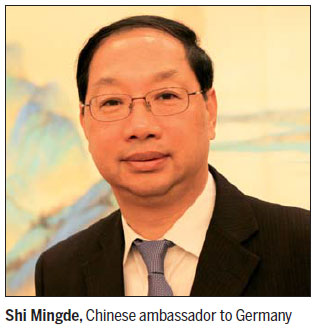A relationship worth its weight
Updated: 2014-03-28 08:39
By Zhang Chunyan in Berlin (China Daily Europe)
|
|||||||||||
President Xi Jinping's visit to Germany will determine the strategic development direction for bilateral relations in the coming years, says China's ambassador to the country, Shi Mingde.
"Xi's visit will foster mutual understanding and trust between him and Chancellor Angela Merkel and further pragmatic cooperation," Shi says.
Xi's visit, his first to Germany since he became president, demonstrates the great importance the leadership attaches to developing China-Germany and China-Europe relations, he says.
In recent years, there have been frequent visits by leaders of the two countries to their counterpart's country. In 2010, the two countries elevated their bilateral relationship to a comprehensive strategic partnership.
In recent years China and Germany, the world's second and fourth largest economies, have been working in their own ways, but also together, to deal with the financial crises, and their economic and trade ties have become both more expansive and more intimate.
China and Germany are the largest trading partners to each other in their regions, and trade between the two accounts for nearly one third of China-Europe trade, which is equivalent to the total of China-UK, China-France and China-Italy trade.

Germany is Europe's largest investor in China. Investment grew by 43 percent, or $2.08 billion, last year. More than 7,500 German companies operate in China, 71 percent of them making a profit.
Chinese investment in Germany was worth $830 million last year, 29 percent more than the year before, including investment in financial services, auto parts, construction machinery, and renewable energy like solar energy.
"China is pushing on with modernization which embraces industrialization, informatization, urbanization and agricultural modernization and these can become new priority areas for cooperation," Shi says.
China has given greater access to investment, set up the Shanghai pilot free trade zone, and continued to open up, presenting German companies huge business opportunities, he says.
Besides political and economic collaboration, China and Germany are enjoying increasingly closer exchanges in culture, education and people-to-people engagement, laying a solid foundation and providing dynamism to even closer ties between the countries, Shi says.
In 2012, China staged "Year of Culture" activities in Germany for the first time, and these drew widespread, enthusiastic public support. "Year of Languages" activities were held in China last year, and something similar is to be held in Germany this year.
More than 30,000 Chinese students are studying in Germany and more than 5,400 German students are studying China. There are 14 Confucius institutes in Germany, and more than 300 primary and secondary schools offer Chinese courses. Sixty-nine provinces, states and cities in China and Germany have established friendly relations, and more than 500 colleges and universities maintain cooperative relations.
zhangchunyan@chinadaily.com.cn
(China Daily European Weekly 03/28/2014 page11)
Today's Top News
Partnership with Belgium, EU highlighted
Turkish PM wins local elections
Monday's search for MH 370 resumes: AMSA
Families of flight MH370 passengers 'need closure'
Greece passes new reform bill
Dobass demonstrators demand referendum
MH370 relatives demand answers
Turkey starts local elections
Hot Topics
Lunar probe , China growth forecasts, Emission rules get tougher, China seen through 'colored lens', International board,
Editor's Picks

|

|

|

|

|

|





